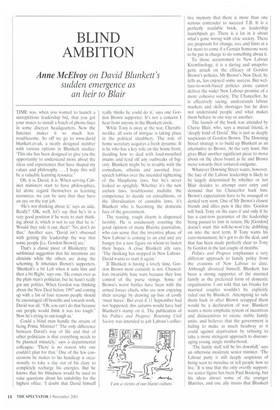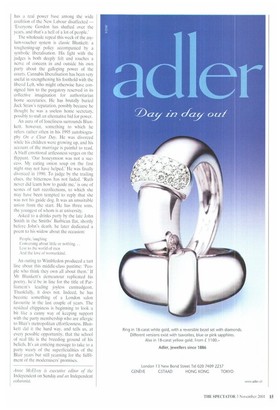BLIND AMBITION
Anne McElvoy on David Blunkett's
sudden emergence as an heir to Blair
TIME was, when you wanted to launch a surreptitious leadership bid, that you got your mates to install a batch of phone-lines in some discreet headquarters. Now the Internet makes it so much less troublesome. So off we go to www.david blunkett.co.uk, a neatly designed number with various options in Blunkett studies: This site has been designed to give you the opportunity to understand more about the ideas and experiences that have shaped my values and philosophy . . . I hope this will be a valuable learning resource.'
Oh, it is, David, it is. When serving Cabinet ministers start to have philosophies, let alone regard themselves as learning resources, we can be sure that they have an eye on the top job.
'He's not thinking about it,' says an aide, Really? -OK, well, let's say that he's in a very good position if he were to start thinking about it, which is not to say that he is.' Would they rule it out, then? `No, don't do that.' Another says, 'David isn't obsessed with getting the leadership the way that some people [i.e. Gordon Brown] are.'
That's a classic piece of Blunkettry: the subliminal suggestion that his intentions are altruistic white the others are doing the scheming. It infuriates Brown's supporters. `Blunkett's a bit Left when it suits him and then a bit Right,' says one. 'He comes over as the plain man's politician, but he hasn't really got any politics. When Gordon was thinking about the New Deal before 1997 and coming up with a list of four reasons people should be encouraged off benefits and towards work, David was all, "Oh, you can't do that because our people would think it was too tough.Now he's trying to out-tough us.'
Could a blind man handle the strains of being Prime Minister? 'The only difference between David's way of life and that of other politicians is that everything needs to be planned minutely,' says a departmental colleague. 'There is no reason why one couldn't plan for that.' One of the few concessions he makes to his handicap is occasionally to take a day out of his diary to completely recharge his energies. But he knows that his blindness would be used to raise questions about his suitability for the highest office. 'I doubt that David himself really thinks he could do it,' says one Gordon Brown supporter. It's not a concern I hear from anyone in the Blunkett circle.
While Tony is away at the war, Cherubino-like, all sorts of intrigue is taking place in the political shrubbery. The role of home secretary acquires a fresh dynamic. It is he who has a key role on the home front, deciding how to deal with loud-mouthed imams and fend off any outbreaks of bigotry. Blunkett might be in trouble with the comedians, atheists and assorted freespeech lobbies over the intended tightening of the blasphemy laws, but he's never looked so sprightly. Whether it's the new asylum laws, troublesome mullahs, the competence to decide on extraditions, or the liberalisation of cannabis laws, it's Blunkett who is becoming the domestic face of the government.
The teasing, rough charm is dispensed lavishly. He is assiduously courting the good opinion of many Blairite journalists, who can sense that the inventive phase of New Labour is coming to an end and are hungry for a new figure on whom to fasten their hopes. A close Blunkett ally says, 'The thinking has stopped in New Labour. David wants to start it again.'
If Blunkett is having a lovely time, Gordon Brown most certainly is not. Chancellors invariably hate wars because they lose control of the purse strings. Some of Brown's worst battles have been with the armed forces chiefs, who are now enjoying their revenge by drawing up lists of costly 'must haves'. But even if 11 September had not happened, this autumn would have had Biunkett's stamp on it. The publication of his Politics and Progress: Renewing Civil Society was intended to jolt Labour's collec
tive memory that there is more than one serious contender to succeed TB. It is a perfectly readable book, as leadership launchpads go. There is a lot in it about what's gone wrong with civic society. There are proposals for change, too, and hints at a lot more to come if a Certain Someone were to be put in charge to do something about it.
To those accustomed to New Labour Kremlinology, it is a daring and unapologetic attack on the efficacy of Gordon Brown's policies. Mr Brown's New Deal, he tells us, has enjoyed some success. But welfare-to-work-based policies alone cannot deliver the wider New Labour promise of a more cohesive society. The Chancellor, he is effectively saying, understands labour markets and skills shortages but he does not understand people and what makes them behave in one way or another.
The launch of the book was attended by Cherie Blair, who, says a mutual friend, is 'deeply fond of David'. She is just as deeply suspicious of Gordon Brown. The Downing Street strategy is to build up Blunkett as an alternative to Brown. At the very least, this gives Blair another significant piece to move about on the chess board as he and Brown move towards their tortured endgame.
Whatever Downing Street wants, however. the fate of the Labour leadership is likely to be largely determined by whether or not Blair decides to attempt euro entry and demand that his Chancellor back him. Brown's expectations have to be assuaged or denied very soon. One of Mr Brown's closest friends and allies puts it like this: 'Gordon will back Tony on the euro if and only if he has a cast-iron guarantee of the leadership being passed to him in return. He [Gordon] doesn't want this will-he-won't-he dribbling on into the next term. If Tony wants his euro-monument, he's got to do the deal, and that has been made perfectly clear to Tony by Gordon in the last couple of months.'
Politics and Progress emphasises a very different approach to family policy from the evasions of New Labour to date. Although divorced himself, Blunkett has been a strong supporter of the married family as the preferred form of domestic organisation. I am told that tax breaks for married couples wouldn't be explicitly ruled out by Blunkett. Attempting to rule them back in after Brown scrapped them would be a declaration of war. Blunkett wants a more emphatic system of incentives and disincentives to create stable family units, and believes that the government is failing to make as much headway as it could against deprivation by refusing to take a more stringent approach to discouraging young, single motherhood.
The family stuff will be his downfall,' says an otherwise moderate senior minister. 'The Labour party is still deeply suspicious of being seen to moralise or tell people how to live.' It is true that the only overtly supportive senior figure has been Paul Boateng, but his ideas attract some of the younger Blairites, and one ally insists that Blunkett
has a real power base among the wide coalition of the New Labour disaffected — 'Everyone Gordon has shafted over the years, and that's a hell of a lot of people.'
The wholesale repeal this week of the asylum-voucher system is classic Blunkett: a toughening-up policy accompanied by a symbolic liberalisation. His fight with the judges is both deeply felt and touches a nerve of concern in and outside his own party about the galloping power of the courts. Cannabis liberalisation has been very useful in strengthening his foothold with the liberal Left, who might otherwise have consigned him to the purgatory reserved in its collective imagination for authoritarian home secretaries. He has brutally buried Jack Straw's reputation, possibly because he thought he was a useless home secretary, possibly to stall an alternative bid for power.
An aura of of loneliness surrounds Blunkett, however, something to which he refers rather often in his 1995 autobiography On a Clear Day. He was divorced while his children were growing up, and his account of the marriage is painful to read. A bluff emotional artlessness verges on the flippant. Our honeymoon was not a success. My eating onion soup on the first night may not have helped.' He was finally divorced in 1990, To judge by the trailing clues, the bitterness has not faded. 'Ruth never did learn how to guide me,' is one of scores of tart recollections, to which she may have been tempted to reply that she was not his guide dog. It was an unsuitable union from the start. He has three sons, the youngest of whom is at university.
Asked to a drinks party by the late John Smith in the Smiths' Barbican flat, shortly before John's death, he later dedicated a poem to his widow about the occasion: People, latching Conversing about little or nothing... Lost to the world of men And the love of womankind.
An outing to Wimbledon produced a tart line about this middle-class pastime: 'People who think they own all about them.' If Mr Blurikett's demeanour replicated his poetry, he'd be in line for the title of Parliament's leading joyless curmudgeon. Thankfully, it does not. Indeed, he has become something of a London salon favourite in the last couple of years. The residual chippiness is beginning to look a bit like a canny way of keeping support with the party membership who are allergic to Blair's metropolitan effortlessness. Blunkett did it the hard way, and tells us, at every possible opportunity-, that the school of real life is the breeding ground of his beliefs. It's an enticing message to take to a party weary of the superficialities of the Blair years but still yearning for the fulfilment of the modernisers' promises.
Anne McElvoy is executive editor of the Independent on Sunday and an Independent columnist.



















































































 Previous page
Previous page